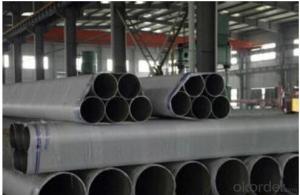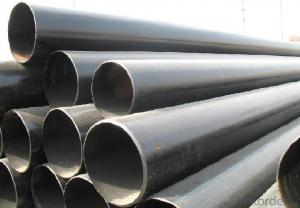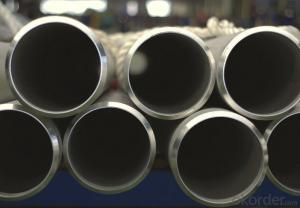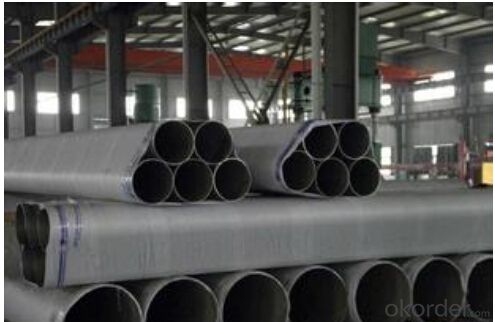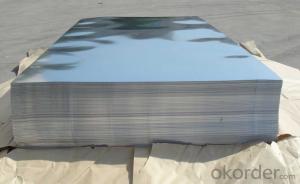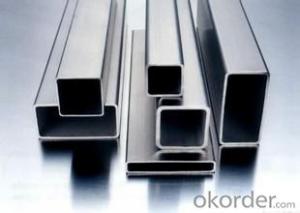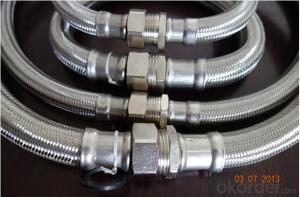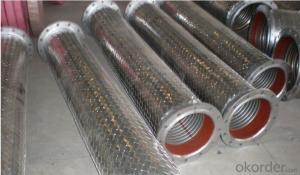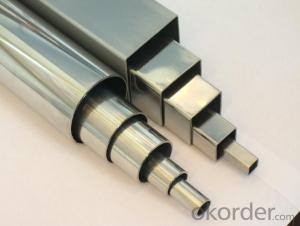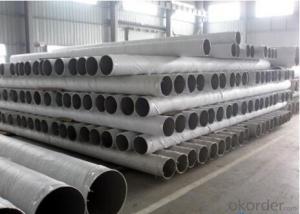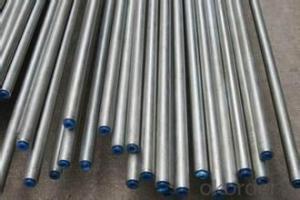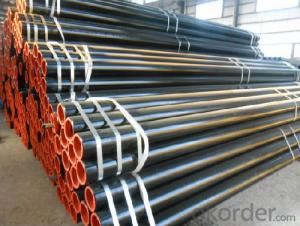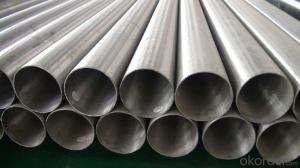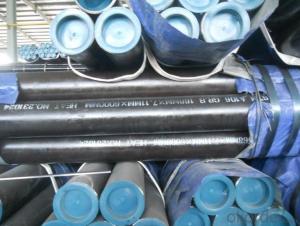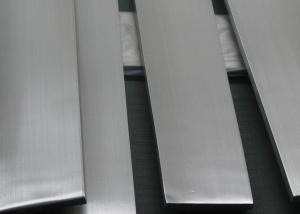Stainless Steel Seamless Pipe 316 ASTM A312
- Loading Port:
- Ningbo
- Payment Terms:
- TT OR LC
- Min Order Qty:
- 1 m.t.
- Supply Capability:
- 5000 m.t./month
OKorder Service Pledge
OKorder Financial Service
You Might Also Like
1、Structure of Stainless Steel Seamless Pipe 316 ASTM A312 Description:
Stainless seamless pipe is formed by drawing a solid billet over a piercing rod to create the hollow shell. As the manufacturing process does not include any welding, seamless pipes are perceived to be stronger and more reliable. Historically seamless pipe was regarded as withstanding pressure better than other types, and was often more easily available than welded pipe.
2、Main Features of the Stainless Steel Seamless Pipe 316 ASTM A312:
• High manufacturing accuracy
• High strength
• Small inertia resistance
• Good visual effect
•Reasonable price
3、Stainless Steel Seamless Pipe 316 ASTM A312 Images:
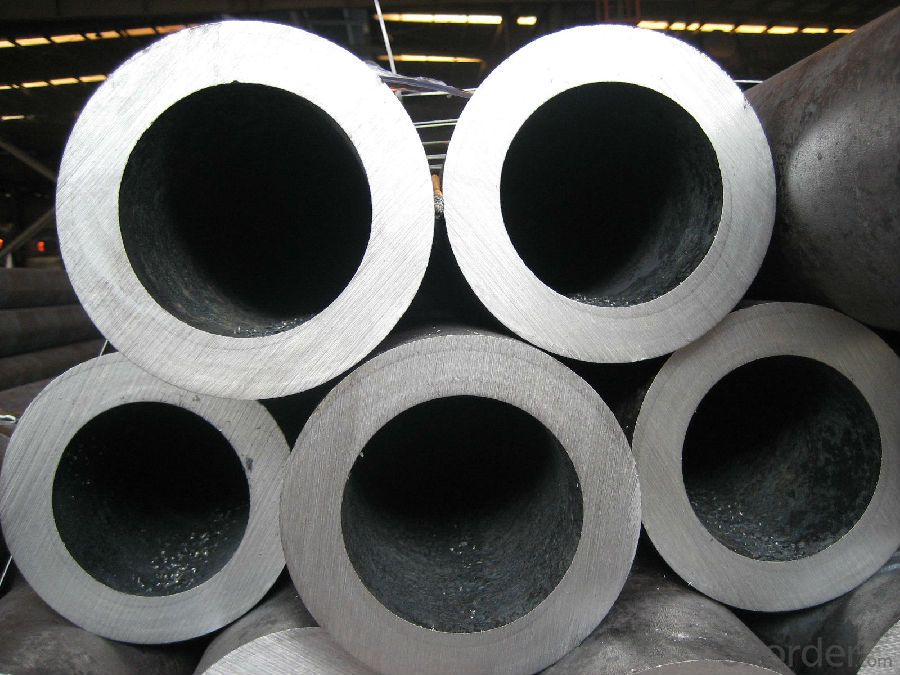
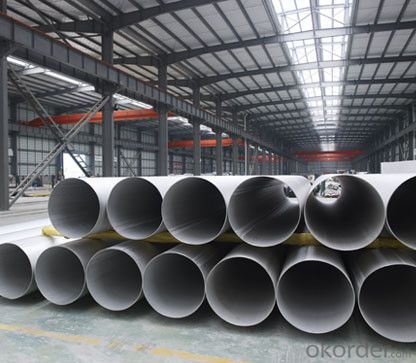
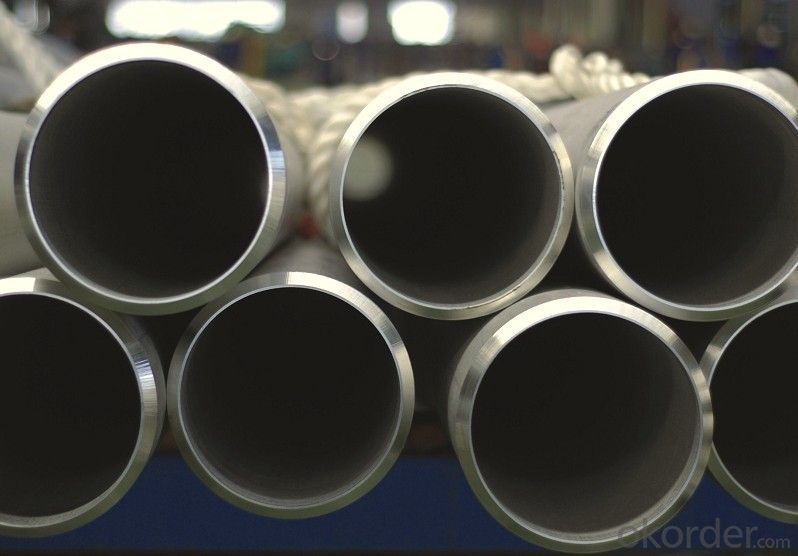
4、Stainless Steel Seamless Pipe 316 ASTM A312 Specification:
| Standard | ASTM A213/A213M-06,ASTM A312/A312M-06, ASTM A376/A376M-06,ASTM A789/A789M-05b, ASTM A790/A790M-05b,ASTM A268/A268M-05a, ASTM A269 |
GB/T 13296-2007,GB/T 14976-2002 | |
| JIS G3459-2004,JIS G3163-2006,JIS G3467-1988 | |
| Material : | 201,202 ,304,304L,304N,304LN,301,305,309S,310S,316,316L,316N,316LN,316Ti 317,317L,321,347, 321h,347,904L,2205,S31803, |
| Dimension: | 5*5mm~150*150mm |
| Thickness : | 0.4mm~80mm |
| Length : | 3m,4m,5.8m,6m,12m or as required |
| Surface : | Annealing ,polish,pickling,bright ,sand blast ,etc |
| Packing: | Standard export seaworthy package or as customer's demand |
| Application: | petroleum ,chemical industry,bolier ,heat exchange,high temperature resistant transmission, fluid pipe in power station,ship with pressure pipe,construction and so on. |
| Delivery: | prompt delivery |
| Quality control: | Mill Test Certificate is supplied with shipment.Third Part Inspection is also acceptable |
5、FAQ of Stainless Steel Seamless Pipe 316 ASTM A312:
①How is the quality of your products?
Our products are manufactured strictly according to national and internaional standard, and we take a test
on every pipe before delivered out. If you want see our quality certifications and all kinds of testing report, please just ask us for it.
Guaranteed: If products’ quality don’t accord to discription as we give or the promise before you place order, we promise 100% refund.
②How about price?
Yes, we are factory and be able to give you lowest price below market one, and we have a policy that “ for saving time and absolutely honest business attitude, we quote as lowest as possible for any customer, and discount can be given according to quantity”,if you like bargain and factory price is not low enough as you think, just don’t waste your time.Please trust the quotation we would give you, it is professional one.
③Why should you chose us?
Chose happens because of quality, then price, We can give you both.Additionally, we can also offer professional products inquiry, products knowledge train(for agents), smooth goods delivery, exellent customer solution proposals.Our service formula: good quality+good price+good service=customer’s trust
SGS test is available, customer inspection before shipping is welcome, third party inspection is no problem.
Any question, pls feel free to contact us !
- Q: Can stainless steel pipes be used for desalination systems?
- Indeed, desalination systems can utilize stainless steel pipes. This material, known for its resistance against corrosion, can withstand the demanding conditions present in desalination processes, wherein salt and other impurities are extracted from seawater. The exceptional corrosion resistance of stainless steel renders it a prime selection for conveying the treated water, as it aids in preserving the water's purity and preventing any contamination. Furthermore, stainless steel pipes possess commendable mechanical attributes, such as strength and durability, which are indispensable for the effective operation of desalination systems.
- Q: How do you remove scratches from stainless steel pipes?
- To remove scratches from stainless steel pipes, you can start by using a non-abrasive cleaner or a mixture of baking soda and water to gently scrub the scratched area. For deeper scratches, you can try using a fine-grit sandpaper or a stainless steel scratch removal kit. Remember to follow the grain of the stainless steel and apply light pressure to avoid further damage.
- Q: Can stainless steel pipes be insulated with polyvinyl chloride?
- Yes, stainless steel pipes can be insulated with polyvinyl chloride (PVC). PVC is a commonly used material for pipe insulation due to its excellent thermal properties and resistance to moisture, chemicals, and corrosion. It is a cost-effective solution that provides insulation to prevent heat loss or gain in the pipes, protecting them from extreme temperatures and reducing energy consumption. PVC insulation is available in various forms, such as pre-formed tubes or sheets, which can be easily installed on stainless steel pipes. However, it is important to ensure that the PVC insulation is compatible with stainless steel and meets the necessary industry standards to avoid any potential issues or degradation of the pipes.
- Q: How are stainless steel pipes joined or connected?
- Stainless steel pipes can be joined or connected using various methods such as welding, threading, flanging, and compression fittings.
- Q: What is the difference between 347 and 347H stainless steel pipes?
- The carbon content is the main distinguishing factor between 347 and 347H stainless steel pipes. In the case of 347 pipes, the maximum carbon content is 0.08%, while 347H pipes have a higher carbon content range of 0.04-0.10%. This increased carbon content in 347H pipes contributes to enhanced strength at high temperatures and greater resistance to sensitization, which is the formation of chromium carbides at grain boundaries that can lead to intergranular corrosion. Because of its higher carbon content, it is generally recommended to use 347H stainless steel pipes for applications involving elevated temperatures and thermal cycling. These pipes exhibit improved resistance to creep and can withstand higher levels of stress compared to 347 stainless steel pipes. Industries such as chemical processing, petrochemical, and power generation commonly employ 347H pipes due to their exposure to high temperatures and corrosive environments. To summarize, the disparity between 347 and 347H stainless steel pipes rests in their carbon content. 347H pipes offer superior strength at high temperatures and resistance to sensitization. The choice between the two depends on the specific requirements and conditions of the application.
- Q: Can stainless steel pipes be used for chemical refineries?
- Indeed, chemical refineries can utilize stainless steel pipes. Stainless steel possesses exceptional resistance to corrosion, rendering it an appropriate option for the management of diverse chemicals and corrosive substances prevalent in refineries. It provides exceptional strength, durability, and high temperature resistance, making it an ideal choice for the arduous conditions and demanding settings within chemical refineries. Moreover, stainless steel pipes are effortless to clean and maintain, a critical aspect in industries where cleanliness is of utmost importance to prevent contamination or compromise product quality. In summary, stainless steel pipes are extensively employed in chemical refineries due to their corrosion resistance, strength, and long lifespan.
- Q: Can stainless steel pipes be etched?
- Yes, stainless steel pipes can be etched. Etching is a process of removing a thin layer of metal from the surface of the pipe to create a desired design or pattern. This is typically done using an acid or chemical solution that selectively dissolves the exposed metal. However, it is important to note that not all grades of stainless steel are equally suitable for etching. Austenitic stainless steels, such as 304 and 316, are commonly used for etching due to their corrosion resistance and ease of etching. Other factors that can influence the etching process include the composition and thickness of the stainless steel, as well as the etching method and conditions used.
- Q: Can stainless steel pipes be coated or painted?
- Yes, stainless steel pipes can be coated or painted. Coating or painting stainless steel pipes can provide additional protection against corrosion, enhance aesthetics, or fulfill specific functional requirements. However, it is important to use coatings or paints specifically designed for stainless steel to ensure optimal adhesion and durability.
- Q: What is the external insulation used for stainless steel pipes?
- The external insulation used for stainless steel pipes is typically a heat-resistant material, such as fiberglass or mineral wool, which is applied to the outside of the pipe to prevent heat transfer and protect against corrosion.
- Q: Can stainless steel pipes be used for power generation applications?
- Yes, stainless steel pipes can be used for power generation applications. Stainless steel is a popular choice for pipes in power generation due to its high corrosion resistance, durability, and strength. It can withstand high temperatures and pressures, making it suitable for various power generation processes such as thermal power plants, nuclear power plants, and hydroelectric power plants. Stainless steel pipes are commonly used in power generation applications for several reasons. Firstly, stainless steel has excellent resistance to corrosion, both from high-temperature steam and chemicals commonly used in power generation processes. This resistance ensures that the pipes remain intact and reliable over a long period of time, reducing maintenance and replacement costs. Secondly, stainless steel pipes are known for their durability and strength. They can withstand the high pressures and temperatures generated during power generation without deforming or breaking. This is crucial for ensuring the safety and efficiency of power generation systems. Furthermore, stainless steel is also highly resistant to scaling and fouling, which can occur in power generation applications due to the presence of impurities in water or steam. The smooth surface of stainless steel pipes helps minimize the buildup of deposits, ensuring efficient heat transfer and preventing clogging or blockage. Lastly, stainless steel pipes are compatible with a wide range of power generation fuels, including coal, natural gas, oil, and renewable energy sources. They can handle the corrosive effects of these fuels and maintain their structural integrity. In summary, stainless steel pipes are well-suited for power generation applications due to their corrosion resistance, durability, strength, and compatibility with various fuels. They offer a reliable and long-lasting solution for transporting fluids and gases in power generation systems.
Send your message to us
Stainless Steel Seamless Pipe 316 ASTM A312
- Loading Port:
- Ningbo
- Payment Terms:
- TT OR LC
- Min Order Qty:
- 1 m.t.
- Supply Capability:
- 5000 m.t./month
OKorder Service Pledge
OKorder Financial Service
Similar products
Hot products
Hot Searches
Related keywords
